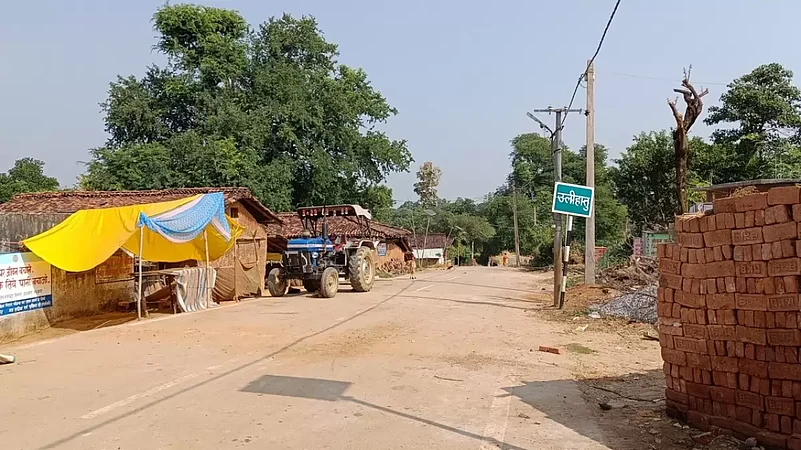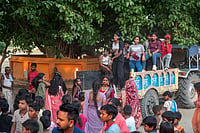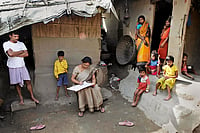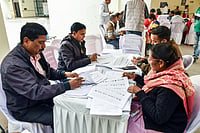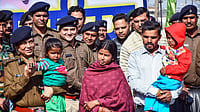Birsa Munda, who was martyred fighting the British at the age of 25, is a name that no political party can afford to ignore while courting the tribal vote. In recent years, the BJP has led the efforts to make the tribal icon’s name its own. Many schemes in the tribal-dominated states have been named after the legend. Jharkhand, Madhya Pradesh, Chhattisgarh and Rajasthan have witnessed several announcements in the name of Birsa, and ministers and leaders do not forget to invoke him in their election campaign speeches.
Ulihatu village in Jharkhand’s Khunti district, the birthplace of the icon of India’s 10 crore tribals: Dharti Aaba (God on Earth) Birsa Munda, has been the site of several historic visits in the past decade. Last year on the occasion of his birth anniversary on November 15, President Droupadi Murmu had visited this village and this year Prime Minister Narendra Modi is visiting. These were the first-ever visits of a PM and president to the village in the 75 years since independence. Although other leaders such as former Home Minister Rajnath Singh and Home Minister Amit Shah and union minister Arjun Munda have paid several visits to this place.
Jharkhand Foundation Day is also celebrated on November 15, which has been declared as national Tribal Pride Day. On this occasion, PM Modi is expected to announce several schemes during his two-day visit and flag off the Viksit Bharat Sankalp Yatra (a rally for the pledge of developed India) from Birsa Munda’s birthplace.
He is set to launch the PVTG ( Particularly Vulnerable Tribal Groups) Development mission, which would allocate schemes worth 24 thousand crore for 28 lakh people from these tribal groups. The PM will also inaugurate and lay foundation stones for projects worth 72,000 crore in areas such as railways, roads, education, coal and petroleum. He is also set to release the 15th installment of the PM Kisan Samman Nidhi (Prime Minister's Farmer's Tribute Fund, worth 18,000 crore) from the land of Birsa.
As the electoral campaign is on for the tribal-dominated states of Madhya Pradesh, Chhattisgarh, Rajasthan and Telangana, the political implications of the prime minister’s two-day Jharkhand visit (November 14-15) are in focus. Senior journalist Faisal Anurag says, “The trip and announcements are a political message for the states where voting is yet to take place. These are also preparations for the Lok Sabha elections. It is difficult to predict how these announcements would affect the polling in the remaining seats. However, the tour definitely takes into account the ongoing assembly elections.”
Chhattisgarh and MP are states that border Jharkhand. Of the 639 seats in the four states, polling has been completed only in 20 seats in Chhattisgarh on November 7, while the remaining 619 seats will go to the polls on November 17, 23 and 30.
Senior journalist Ravi Prakash also believes that the PM’s Jharkhand visit and announcements could affect the states in the electoral fray. He says, “The BJP is also focusing on next year’s Jharkhand assembly polls and the general elections. Some decisions by the Raghubar Das-led BJP government had angered the tribal community. This resulted in the BJP winning just two out of the 28 seats reserved for tribals in the 2019 Jharkhand assembly elections. With this visit, the BJP is also aiming to win back its disappearing Adivasi vote-bank.”
As the model code of conduct is in place in the states where elections are being held, no announcements can be made there. Therefore, the PM’s visit to Ulihatu on Birsa Munda’s birth anniversary and the launching of schemes from there becomes significant. Even in the past, PM Modi has announced major schemes from Jharkhand. For example, the Ayushman Bharat scheme was announced in Ranchi on 14 April 2018, on the birth anniversary of Bhimrao Ambedkar.
Only the election results on December 3 will show how beneficial the PM’s visit is going to be for the BJP.
(Translated by Iqbal)







